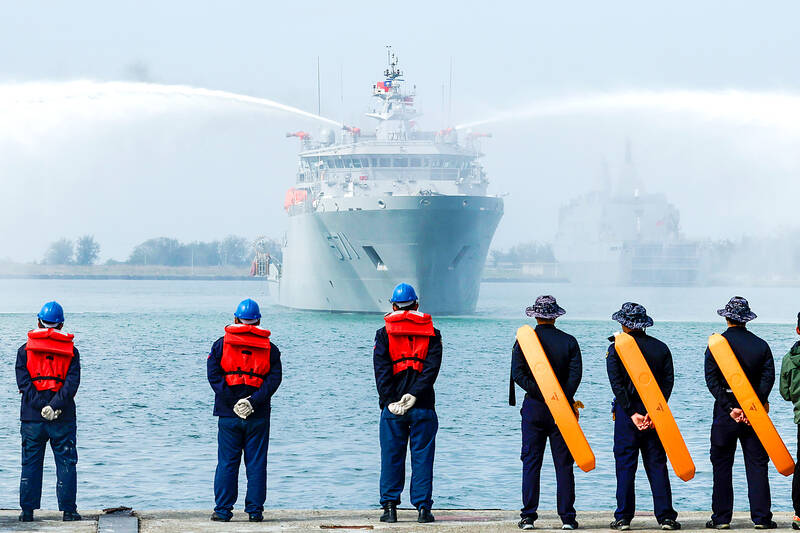The Ministry of National Defense yesterday declined to say whether Taiwan is pursuing a multibillion-dollar weapons purchase from the US, after sources briefed on the matter said that officials are in talks with Washington to procure at least US$7 billion of arms.
Three sources familiar with the situation, speaking on condition of anonymity given the sensitivity of the situation, told Reuters that Taiwan is in talks with Washington.
The package is meant to demonstrate to the US that Taiwan is committed to its defense, one of the sources said.

Photo: Ritchie B. Tongo, EPA-EFE
A second source said the package would include coastal defense cruise missiles and High Mobility Artillery Rocket Systems.
“I would be very surprised if it was less than US$8 billion. Somewhere between US$7 billion and US$10 billion,” the source added.
The White House did not immediately respond to a request for comment.
However, US National Security Adviser Mike Waltz has said he wants to speed up delivery of weapons to Taiwan.
The ministry declined to comment on specific purchases, but said it is focused on building its defenses.
“Any weaponry and equipment that can achieve those goals for building the military are listed as targets for tender,” said Major General Weng Yu-heng (翁予恒) from the Department of Strategic Planning.
The ministry would plan a special budget based on the threats posed by enemies, how urgently certain types of weapons are needed, production capacity and estimated delivery schedules, Weng added.
However, a third source said that Taiwan plans to propose a special defense budget that prioritizes precision ammunition, air defense upgrades, command and control systems, equipment for reserve forces and anti-drone technology.
Another ministry source told the Chinese-language Liberty Times (the Taipei Times’ sister paper) that the military is assessing measures to bolster the nation’s resilience, including projects related to armed forces reserves, asymmetric capabilities, precision-guided munition stockpiles, and intelligence surveillance and reconnaissance capabilities in the air and sea.
Following a national security meeting on Friday last week, President William Lai (賴清德) said that he would prioritize efforts to plan a special budget to raise Taiwan’s national defense budget to 3 percent of GDP to bolster its self-defense capabilities.
During his first term from 2017 to 2021, US President Donald Trump made regular arms sales to Taiwan, including multibillion dollar deals for F-16 jets.
The administration of former US president Joe Biden continued those sales, although often with smaller price tags.
Taiwan does not believe Trump is looking to make a “grand bargain” with Chinese President Xi Jinping (習近平) to sell out Taiwan’s interests, one of the sources said.
Trump is more concerned with putting tariffs on semiconductors, the source said.
In another sign of US commitment to Taiwan, American Institute in Taiwan Director Raymond Greene is to retain his post, three sources told Reuters, even as other US diplomatic postings undergo major reshuffles.
Additional reporting by Su Yung-yao and CNA

INVESTIGATION: The case is the latest instance of a DPP figure being implicated in an espionage network accused of allegedly leaking information to Chinese intelligence Democratic Progressive Party (DPP) member Ho Jen-chieh (何仁傑) was detained and held incommunicado yesterday on suspicion of spying for China during his tenure as assistant to then-minister of foreign affairs Joseph Wu (吳釗燮). The Taipei District Prosecutors’ Office said Ho was implicated during its investigation into alleged spying activities by former Presidential Office consultant Wu Shang-yu (吳尚雨). Prosecutors said there is reason to believe Ho breached the National Security Act (國家安全法) by leaking classified Ministry of Foreign Affairs information to Chinese intelligence. Following interrogation, prosecutors petitioned the Taipei District Court to detain Ho, citing concerns over potential collusion or tampering of evidence. The

‘FORM OF PROTEST’: The German Institute Taipei said it was ‘shocked’ to see Nazi symbolism used in connection with political aims as it condemned the incident Sung Chien-liang (宋建樑), who led efforts to recall Democratic Progressive Party (DPP) Legislator Lee Kun-cheng (李坤城), was released on bail of NT$80,000 yesterday amid an outcry over a Nazi armband he wore to questioning the night before. Sung arrived at the New Taipei City District Prosecutors’ Office for questioning in a recall petition forgery case on Tuesday night wearing a red armband bearing a swastika, carrying a copy of Adolf Hitler’s Mein Kampf and giving a Nazi salute. Sung left the building at 1:15am without the armband and apparently covering the book with a coat. This is a serious international scandal and Chinese

Seventy percent of middle and elementary schools now conduct English classes entirely in English, the Ministry of Education said, as it encourages schools nationwide to adopt this practice Minister of Education (MOE) Cheng Ying-yao (鄭英耀) is scheduled to present a report on the government’s bilingual education policy to the Legislative Yuan’s Education and Culture Committee today. The report would outline strategies aimed at expanding access to education, reducing regional disparities and improving talent cultivation. Implementation of bilingual education policies has varied across local governments, occasionally drawing public criticism. For example, some schools have required teachers of non-English subjects to pass English proficiency

TRADE: The premier pledged safeguards on ‘Made in Taiwan’ labeling, anti-dumping measures and stricter export controls to strengthen its position in trade talks Products labeled “made in Taiwan” must be genuinely made in Taiwan, Premier Cho Jung-tai (卓榮泰) said yesterday, vowing to enforce strict safeguards against “origin laundering” and initiate anti-dumping investigations to prevent China dumping its products in Taiwan. Cho made the remarks in a discussion session with representatives from industries in Kaohsiung. In response to the US government’s recent announcement of “reciprocal” tariffs on its trading partners, President William Lai (賴清德) and Cho last week began a series of consultations with industry leaders nationwide to gather feedback and address concerns. Taiwanese and US officials held a videoconference on Friday evening to discuss the